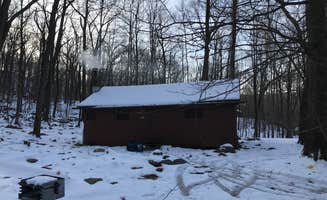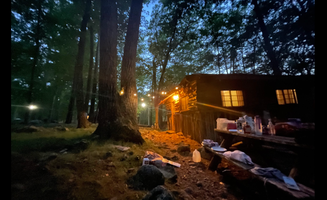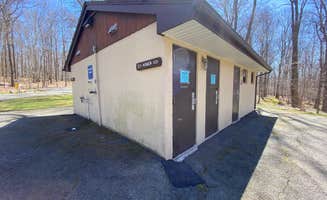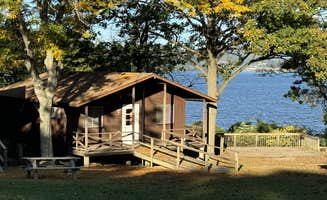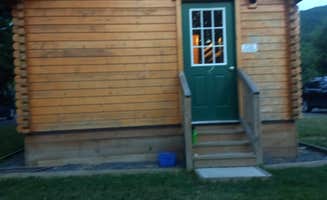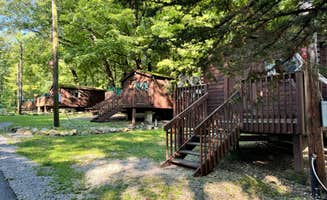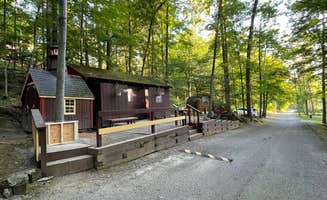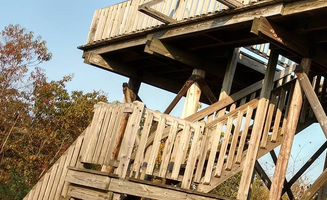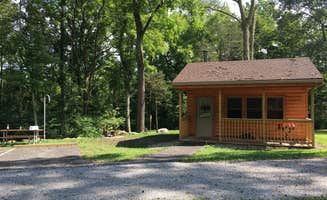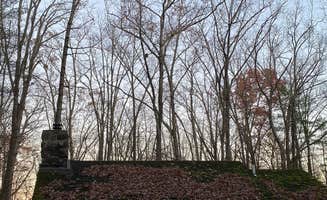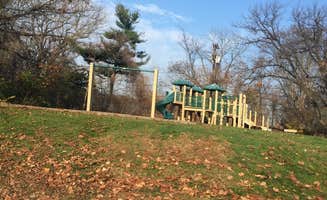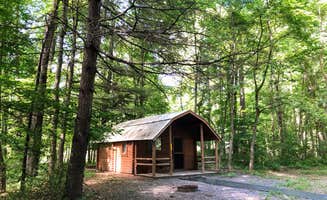Cabin rental options near Oakland, New Jersey provide overnight shelter in the forested highlands of northern New Jersey, with elevations ranging from 700-1,800 feet. Winter temperatures can drop below freezing, while summer highs typically reach 80-85°F. Most forest cabins remain unheated except for wood stoves, requiring campers to prepare for significant temperature fluctuations during spring and fall seasons.
What to do
Hiking access from cabins: At Stokes State Forest, cabins serve as base camps for extensive trail networks. "There are 21 marked trails that cover over 63 miles within the boundaries of Stokes State Forest. Twelve miles are part of the Appalachian Trail," notes a camper who recommends visiting "Tillman Ravine trail" and making "the trail a loop and visit both the ravine and the nearby old cemetery."
Lake activities: The Stephen & Betsy Corman AMC Harriman Outdoor Center provides cabin access to water recreation. "You can also rent canoes and take them out on the lake for an afternoon activity," explains one visitor. Another mentions that "the lake is very peaceful, and home to beavers we watched from the dining hall patio."
Family recreation: Cabin camping at Panther Lake Camping Resort combines indoor sleeping with outdoor play. "Very kid and pet friendly, lake to fish and kayak on, lots of activities, great pool and awesome hot tub," writes one camper. The facility includes "a covered sitting area also next to the welcome center" and recreation options for children.
What campers like
Rustic cabins with essential comforts: Cabins at Sebago Cabin Camp offer basic shelter with some modern conveniences. "These cabins are VERY rustic, four walls, a cot, and a fridge. You still feel like you are 'roughing it' but with the convenience of a fridge," explains one camper. Another notes each cabin includes "2 rooms with 4 cots" plus "a full fridge and double hot plate outside a fire pit and grill with table."
Quiet locations: Mahlon Dickerson Reservation earns praise for its secluded setting. "This county park has large, wooded campsites with electric and water. It's beautiful and quiet, and close to beautiful hiking trails, lakes, and other outdoor recreation opportunities," writes one visitor. Another adds: "We really like this campground. Quiet and spacious. No facilities, just a porta-jon, but i think that makes it better."
Clean facilities: Camp Glen Gray maintains well-kept cabins. "Cabins are always clean and stocked with firewood. Lots of hiking trails," reports one visitor. Another adds that the "Trading Post for treats and other items" provides convenience items without compromising the rustic atmosphere.
What you should know
Bathroom limitations: Cabin bathroom facilities vary significantly between locations. At High Point State Park Campground, "Showers are at the day use area, from 10-5:30," and there's "no trailer dump." A visitor notes bathrooms have "flush toilets, no sinks, no showers, with that awful outhouse smell. Bringing your own toilet paper is a good idea as the park didn't replace it enough and it ran out."
Winter preparation: During colder months, most cabins rely solely on wood heat. "You need that wood stove to heat up the cabin. Turning on the oven is a help, but not a good solution," explains one Stokes State Forest visitor who used "two bundles of wood in one night, and could have used more in the morning."
Reservation requirements: Most cabins book months in advance for summer and early fall weekends. Great Divide Campground has unique restrictions where "you are not allowed to keep your car at your site. You have to drop your supplies off and drive it back to the parking lot which was slightly annoying."
Tips for camping with families
Activity planning: Plan family outings around on-site recreation options. "Great Divide had a large pool which was used by many of the campers. The common area, along with the pool, had a small soccer field and volleyball court. They also had scheduled activities for kids," notes one visitor.
Meal preparation: Cabin kitchens vary significantly in functionality. Some offer complete setups while others provide minimal cooking tools. At Panther Lake, the "welcome center has a store where you can buy essentials you may have forgotten and then some (cold drinks, milk, cups, pans, condiments, ice cream, etc.)."
Sleeping arrangements: Moon Valley Campground offers unique sleeping structures beyond traditional cabins. "Bring your tent or use the existing glamping tents. Headed back for a fall weekend in the 'dome' which has incredible views," reports one visitor, highlighting alternative shelter options for families seeking more comfort.
Tips from RVers
Site selection: Croton Point Park offers mixed experiences for RVers. "Both the tenting section and RV sites are each very clustered together, and quite crowded," notes one visitor. Another mentions "a mix of w/e (6 sites) and FHU sites plus about a dozen tent sites" with "a loosely defined gravel pad that was level."
Hook-up considerations: Electric and water connections differ between parks. At Mahlon Dickerson, "Website lists water hook ups at long distances but they have hose reels to help with that. Our site (15) said 75' however the 50' hose reel made it to our rv connection."
Equipment restrictions: Size limitations affect larger RVs at most cabin campgrounds. Croton Point sites were "back-to-back and although there were trees separating the sites, they were close together," limiting privacy for larger rigs.


